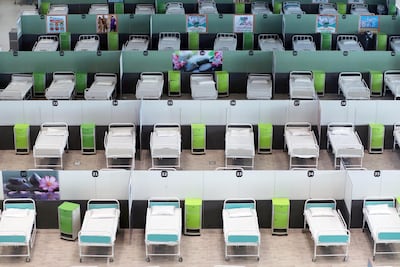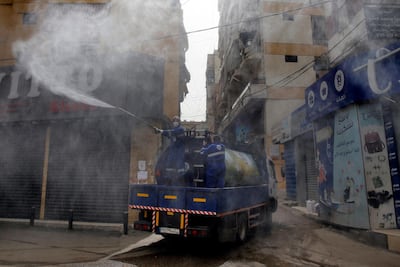In recent weeks, world leaders have ramped up measures to contain the ongoing pandemic of the novel coronavirus and its associated disease, Covid-19. These include the closure of borders, curfews, lockdowns, and allotting more power to governments and their security forces.
Many politicians, from Israel’s Benjamin Netanyahu to Hungary’s Viktor Orban, have seen in this as a golden opportunity to portray themselves as strongmen and saviours of their nations while tightening their grip on power.

It is no surprise that the response to coronavirus, which has been described as a “threat to humanity” by UN Secretary General Antonio Guterres, has been used as a political tool. A more puzzling phenomenon is that a number of countries have also, for their own political ends, refused to respond to the health crisis adequately, with little regards to the damage inflicted on the local population.
Iran is a powerful case in point. Having failed to implement physical distancing and confinement measures in time, Tehran still defends its strategy of stalled action, justified officially by a mix of economic reasons and conspiracy theories; last month, Ayatollah Ali Khamenei referred to the virus as a US “biological attack”.

The 81 million-strong nation has become the epicentre of the outbreak in the Middle East, with official figures climbing beyond 50,000 cases and more than 3,000 deaths. Experts believe that the real numbers are actually much higher. Last month, satellite images circulated of coronavirus burial pits in Qom that are visible from space.
Yet Tehran has downplayed the severity of the epidemic from its onset, which was just a few days ahead of its recent parliamentary elections. The poll has gone down in Iranian history for its record-low participation and resulted in a sweeping victory for conservatives.
Last week, Tehran said it will finally start implementing tough measures to curb the spread of the virus, after having asked for financial assistance from the International Monetary Fund and requested that all economic sanctions be lifted.
But despite these necessary requests for economic help, Iranian President Hassan Rouhani has said that his country will refrain from reinforcing severe restrictions domestically, for economic reasons.
The actions of Iran’s leaders in the face of this dilemma (should they preserve the economy, or preserve the health of the people?) has further eroded the public’s trust in the state, and turned it into an international cautionary tale.

As Iran struggles to end its troubles at home, its proxies and allies in the Middle East have sought to deal with this health crisis in their own way. In some cases, this has led to decisive action, and in others, it has meant undermining any attempt to “flatten the curve”, as slowing the virus’s spread has become known in popular parlance.
What these diverging strategies have in common, however, is that they are less about eradicating a disease, and more about political survival at a time when Iran, the patron of this loose federation of proxies, appears to be in peril.
Lebanon’s Hezbollah, for instance, has distanced itself from Iran’s initial laissez-faire approach to coronavirus, despite claiming that Tehran is doing a great job to halt its spread. Hezbollah Secretary-General Hassan Nasrallah has referred to the virus as an “invisible enemy” that must be quashed, an expression that has been used by world leaders including French President Emmanuel Macron and his American counterpart Donald Trump.
Aligning himself with the international community, Nasrallah even called upon Lebanese society to closely follow the directives issued by the healthcare ministry, which the group controls, in a televised speech. The country has been under lockdown since mid-March, with flights temporarily suspended and physical distancing as well as curfews imposed nationwide. These measures seem to have reassured many Lebanese, and have resulted, at least for a while, in a positive boost for Beirut’s recently formed Hezbollah-aligned government, which was previously plagued by a mass protest movement against it that started last October.
In Iraq, where rival Shiite islamist militias are competing for power, coronavirus has become a new front on which these groups face off and compete. They were once united under the leadership of Qassem Suleimani, the now-deceased head of Al Quds Force, an elite component of Iran’s Islamic Revolutionary Guard Corps that managed its proxies abroad. Since Suleimani’s demise at the hands of the US in January, the groups have engaged in bitter rivalries for dominance.
Supporters of the populist Iraqi cleric Moqtada Al Sadr, who has aligned himself with Iran in the past months, have been encouraged by their leader to go about their business as usual and to continue visiting religious shrines in defiance of a nationwide curfew imposed by Iraqi authorities. This is in spite of the curfew measures being backed by Iraq’s highest Shia religious authority. Last month, Iran-aligned groups marched across Baghdad to flout the new rules for a religious event. These are populist moves to use coronavirus-fighting measures, as opposed to the virus itself, as a bogeyman around which to rally popular support and compete for followers within Iraq’s Shia community.
In Yemen, Iran’s other regional staging ground, the Houthis – a Tehran-backed rebel group – have closed schools in the areas under their rule to curb the spread of the virus, while simultaneously using the opportunity to recruit young men to their ranks. They are also promoting conspiracy theories about the pandemic. The fear-mongering will prove very damaging to curve-flattening efforts in a country that the UN described as the world’s worst humanitarian crisis long before the start of the pandemic.
From Lebanon to Iraq to Yemen, coronavirus is testing the cohesion of Iran’s client groups, and challenging Tehran’s ability to maintain a coherent leadership position among them. In the face of a global crisis, national and local idiosyncrasies have prevailed, revealing the cracks within this supposedly harmonised axis of resistance.
Aya Iskandarani is a staff Comment writer at The National


